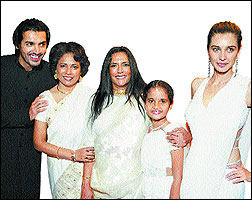|
Fifth Annual IAAC Film Festival
Schedule
Festival Tickets
Opening
Night Ticket
Opening Night
Awards
Advertising
Partners
Sponsors
Pictures
Press Conference
Reviews
Honorees 2005
Auction
Letter
After Parties
Photos |
FIFTH
ANNUAL IAAC FILM FESTIVAL: Indian
Independent & Diaspora Films
- November 2-6, 2005. |
| |
Deepa Mehta's 'Water' opens Indian film festival in New York
By - Uttara Choudhury
DNA
Thursday, November 03, 2005
 NEW YORK: The fifth annual Indian film festival in New York opens on Wednesday with a gala screening of Deepa Mehta's critically acclaimed movie 'Water' which traces the hard lives of Hindu widows and triggered violent protests while being filmed on the banks of the Ganges in India in 2000. NEW YORK: The fifth annual Indian film festival in New York opens on Wednesday with a gala screening of Deepa Mehta's critically acclaimed movie 'Water' which traces the hard lives of Hindu widows and triggered violent protests while being filmed on the banks of the Ganges in India in 2000.
Over the next five days the event organised by the Indo-American Arts Council (IAAC) will screen over 50 short films, documentaries and feature films from the Indian subcontinent and the diaspora.
Sold-out crowds bought $300 tickets to gather at the Lincoln Centre to watch Water - set in 1938 colonial India - launch the festival. Ten Indian movie fans paid $20,000 to sit at a "Pacesetter Table" with Mehta at a gala dinner in Central Park's Tavern on the Green restaurant after the screening of Water.
"It is a very publicly-attended film festival, with thousands of movie fans, film industry figures and celebrities expected to visit," Aroon Shivdasani, executive director of IAAC told DNA. "There is a fascination with India, Bollywood and all things Indian right now so we are expecting a huge turnout," she added.
Opening film Water is the final part of an elemental trilogy by director Mehta who has never baulked at dealing with challenging issues. Her earlier installment "Fire" tackled lesbianism and "Earth," the still sensitive subject of India's partition.
Describing the initial protests against her movie, Mehta said "accusations of Water being anti-Hindu" were cited as the cause of the film sets being thrown in the river, her effigy being burned and protesters marching in the streets of Varanasi, denouncing the film and its portrayal of Hindu widows
."Now that Water is complete, I can look back on the journey it has taken to make it. The anguish, the death threats, the politics, and the ugly face of religious fundamentalism - we experienced them all. Has it been worth it, I often wonder?" said Mehta. "Then the image of a widow ten years ago surfaces in my mind, as she sits on the steps by the Ganges, her toothless mouth making gasping sounds of despair," added the filmmaker.
If Hindu hardliners had there way Mehta's film Water would have never seen the light of day. After the script of Water was passed by India's censor in 2000, shooting began in Varanasi. Soon Shiv Sena activists and other Hindu hardliners burnt down the main set, seized and destroyed all prints and the original negative of the film. With no insurance cover Mehta had to abandon her project but she collected money over the next few years and resurrected the project in Sri Lanka.
"To complete Water had become a personal mission, but it took four years before David Hamilton, the producer, and I resurrected the project in Sri Lanka," said a tenacious Mehta.
The other film on everybody's lips is Amu, based on the 1984 anti-Sikh riots which erupted after the assassination of Indira Gandhi. The film saw a worldwide release in January this year, and earned 40-year-old Los Angeles-based filmmaker Shonali Bose the national award for Best Debut Director. "For me and my generation, the Delhi riots of 1984 made a strong impact on our minds. I've always felt an imperative need to talk of this buried story," Bose told reporters in the run-up to the festival.
Chicken Tikka Masala by Harmage Singh Kalirai which captures a gay Indian American doctor's attempt to avoid an arranged marriage also promises to draw crowds while the festival will give fans an opportunity to see Ismail Merchant's 1999 classic Cotton Mary set in post-colonial India
|
| |
|
|

